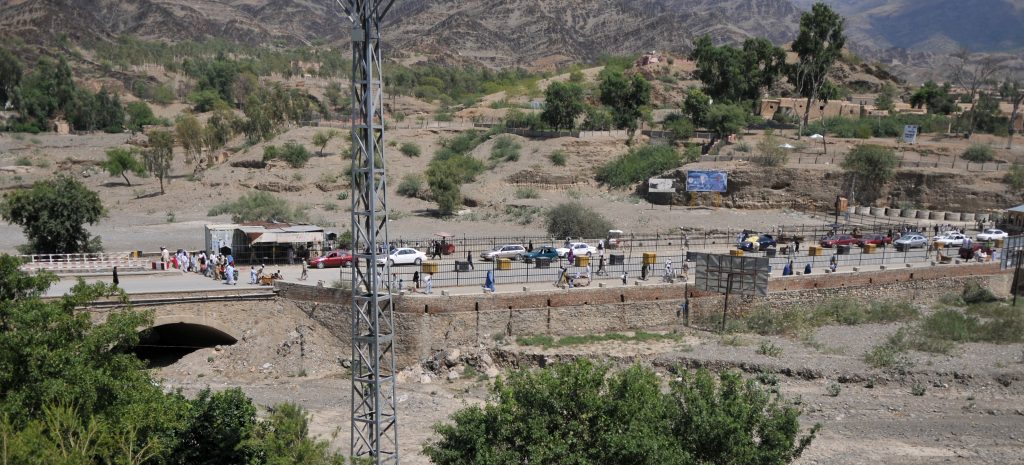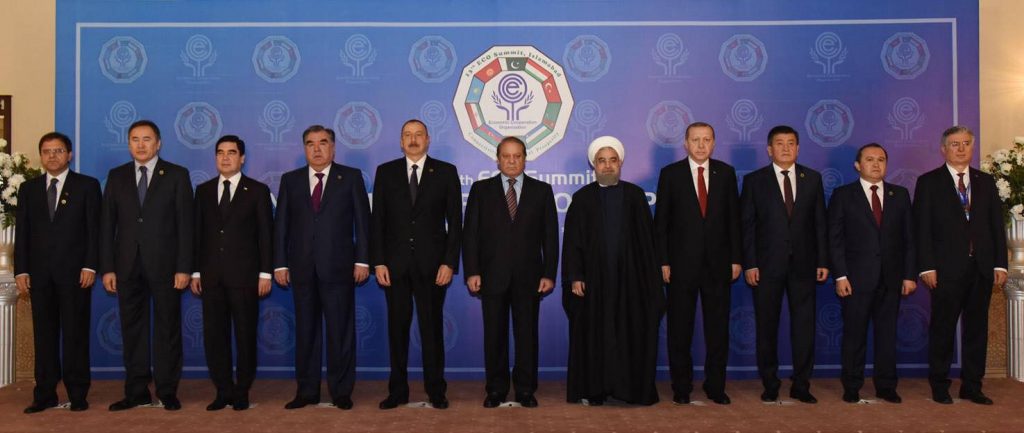
Pakistan-India border at night, Photo: ISS Expedition 28 crew (NASA Earth Observatory) via Wikimedia Commons
US Centcom Chief General Joseph L. Votel Thursday told Capitol Hill that India’s policy to ‘diplomatically isolate’ Pakistan hurts prospects for improved relations in the region.
Votel, whose Central Command covers American focus on a large Middle Eastern region including Pakistan and Afghanistan, was testifying before the Senate Armed Services Committee.
In his opening statement, the general told lawmakers that Islamabad’s focus on tensions on its eastern border with India is a distraction for Pakistan’s counterterrorism campaign along its western Afghan border.
“India’s public policy to “diplomatically isolate” Pakistan hinders any prospects for improved relations,” he said of the tension-filled Pakistan-India equation.
“This is especially troubling as a significant conventional conflict between Pakistan and India could escalate into a nuclear exchange, given that both are nuclear powers,” the commander noted.
The statement comes amid ongoing tensions between Pakistan and India over Kashmir. Prime Minister Narendra Modi’s New Delhi has been saying it wants to isolate Pakistan but analysts say that policy has failed.
Pakistan is not only one of the few countries with close strategic ties with both China and the United States but last week also hosted a regional ECO Summit attended by top political leaders and diplomats of 10 countries.
Votel also echoed Pakistan’s concern that any tension with India could harm its counterterror drive along Afghan border – long a hotbed of militants with the IS focus on Afghanistan further amplifying the threat.
In his testimony, the Centcom Chief said “Pakistan’s increased focus on its eastern border detracts from its efforts to secure the western border with Afghanistan from incursion by Taliban and al-Qaida fighters.
“Security along the western border will nevertheless remain a priority for Islamabad, as the Pakistani military seeks to expand border control and improve paramilitary security.”
The Central Command, Gen Votel said, continues to keep an eye on Pakistan-India tensions.
“We also continue to see ongoing tensions between Pakistan and neighboring India. India remains concerned about the lack of action against India-focused militants based in Pakistan and even responded militarily to terrorist attacks in India-held territory earlier this year.
“We assess that these types of attacks and the potential reactions, increase the likelihood for miscalculation by both countries.”
Votel said U.S. relations with Pakistan remain vital. While discussing Afghanistan, the Centcom chief also said the U.S. maintains consistent diplomatic pressure on Islamabad to act against terrorists operating from its soil.
“While there are challenges with respect to the U.S.-Pakistani relationship, we have endeavored to maintain a substantial level of engagement with our Pakistani military counterparts,” he said, referring to a “robust joint exercise program”
For example, Pakistani Air Force sent airmen and aircraft to participate in Exercise RED FLAG and GREEN FLAG at Nellis Air Force Base in Nevada this past summer.
“The Pakistani military also continues to support our efforts elsewhere in the region; most notably, the Pakistani Navy is the most consistent and longstanding participant, second only to the United States, in Combined Task Force (CTF)-150 (counter-terrorism operations) and CTF-151 (counter-piracy operations) led by U.S. Naval Forces Central (USNAVCENT). Our relationship with Pakistan remains a very important one.”
“We look forward to continuing our engagement with the Pakistani military leadership, to include the new Chief of the Army Staff, General Qamar Javed Bajwa, in the days ahead as we work together in pursuit of shared interests.”
Giving an account of where things stand in Afghanistan, which has been facing a Talibarn insurgency and recently the IS attacks. The U.S. still maintains thousands of troops in the landlocked country – which served as haven for al-Qaeda, the perpetrator of 9/11 terrorist attacks.
Stability in Afghanistan is further challenged by the malign influence of external actors, Votel said.

Marine Corps Gen. John R. Allen, commander of NATO and International Security Assistance Force troops in Afghanistan, visited military and civilian personnel assigned to Regional Command-East, Nangarhar province, Sept. 5. Allen received a briefing and walking tour of Torkham Gate area of operations during his visit and thanked U.S. and Afghan forces for their service and sacrifice. ISAF is a key component of the international community’s engagement in Afghanistan, assisting Afghan authorities in providing security and stability while creating the conditions for reconstruction development.
“The enablement of violent extremist groups operating inside of Afghanistan and along the Afghanistan-Pakistan border region, receiving sanctuary or support from outside governments, is of particular concern.”
The death of Taliban Supreme Leader Mullah Akhtar Mansour in a U.S. strike on 21 May 2016 had a disruptive impact on the Taliban and gave a psychological boost to the Afghans.
“However, the group still presents a formidable threat to stability in the Afghanistan-Pakistan (AfPak) sub-region. The convergence of these groups and, in particular, the convergence of the Afghan Taliban and its component, the Haqqani Network, and Lashkar-e-Tayyiba, is of particular concern given the direct threat posed to U.S. and Coalition personnel and the Afghan government. Key to improving the security environment in Afghanistan is eliminating sanctuary of militant groups in Pakistan’s territory.”
The U.S. maintains consistent diplomatic pressure on Pakistan to take appropriate steps to deny safe haven and work to improve the security of the tumultuous Af-Pak border region, he said.
“Pakistan remains a critical partner in the counter-terrorism fight.”
Of the 20 U.S-designated terrorist organizations operate in the Afghanistan-Pakistan sub-region, seven are in Pakistan, he said..
“So long as these groups maintain safe haven inside of Pakistan they will threaten long-term stability in Afghanistan. Of particular concern to us is the Haqqani Network (HQN) which poses the greatest threat to coalition forces operating in Afghanistan.
To date, the Pakistan military and security services have not taken lasting actions against Haqqani network, he said.
“We have seen some promising coordination between the Pakistan and Afghanistan militaries aimed at addressing instability in the Afghanistan-Pakistan border region. The Pakistan military in particular continues to conduct counter-terrorism and counter-insurgency operations in the FATA and facilitate, via ground and air lines of communication, the sustainment of coalition operations in Afghanistan.
“This past year we became increasingly concerned about the growing threat posed by the ISIS affiliate, Islamic State-Khorasan (IS-K). Although their operational capacity has diminished as a result of U.S., Afghanistan, and Pakistan military operations, we remain focused on defeating the group in both countries. Of note, we were encouraged to see the Pakistani military plan and execute a recent named operation in which they set up simultaneous multiple blocking positions along the Afghanistan-Pakistan border in order to reinforce ANDSF efforts to disrupt IS-K activities.”

















